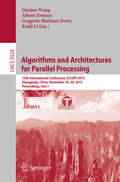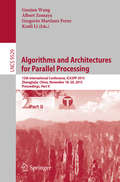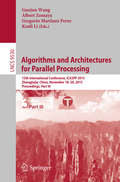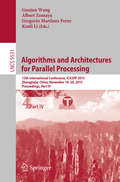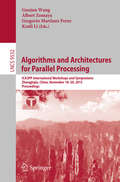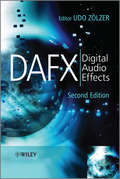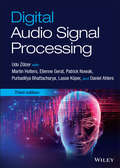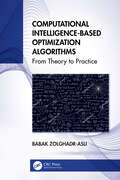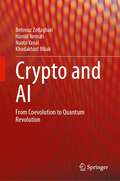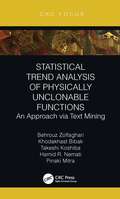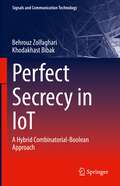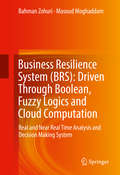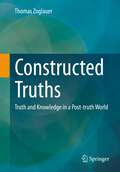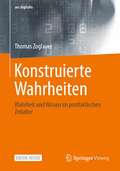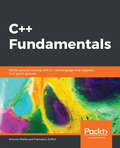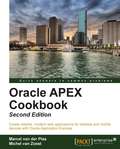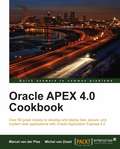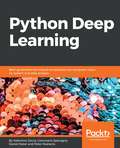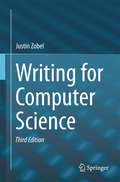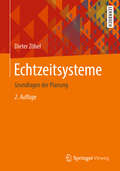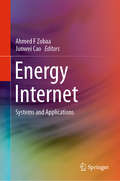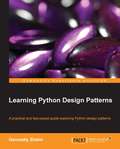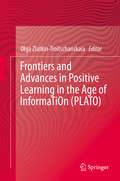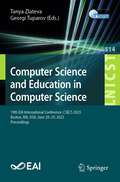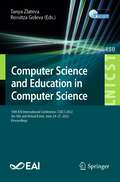- Table View
- List View
Algorithms and Architectures for Parallel Processing: 15th International Conference, ICA3PP 2015, Zhangjiajie, China, November 18-20, 2015, Proceedings, Part I (Lecture Notes in Computer Science #9528)
by Albert Zomaya Guojun Wang Gregorio Martinez Perez Kenli LiThis fourvolume set LNCS 9528, 9529, 9530 and 9531 constitutes the refereed proceedingsof the 15th International Conference on Algorithms and Architectures for ParallelProcessing, ICA3PP 2015, held in Zhangjiajie, China, in November 2015. The 219revised full papers presented together with 77 workshop papers in these fourvolumes were carefully reviewed and selected from 807 submissions (602 fullpapers and 205 workshop papers). The first volume comprises the followingtopics: parallel and distributed architectures; distributed and network-basedcomputing and internet of things and cyber-physical-social computing. Thesecond volume comprises topics such as big data and its applications andparallel and distributed algorithms. The topics of the third volume are:applications of parallel and distributed computing and service dependabilityand security in distributed and parallel systems. The covered topics of the fourthvolume are: software systems and programming models and performance modelingand evaluation.
Algorithms and Architectures for Parallel Processing: 15th International Conference, ICA3PP 2015, Zhangjiajie, China, November 18-20, 2015, Proceedings, Part II (Lecture Notes in Computer Science #9529)
by Albert Zomaya Guojun Wang Gregorio Martinez Perez Kenli LiThis book constitutes the refereed proceedings of the Workshops and Symposiums of the 15th International Conference on Algorithms and Architectures for Parallel Processing, ICA3PP 2015, held in Zhangjiajie, China, in November 2015.<P><P> The program of this year consists of 6 symposiums/workshops that cover a wide range of research topics on parallel processing technology: the Sixth International Workshop on Trust, Security and Privacy for Big Data, TrustData 2015; the Fifth International Symposium on Trust, Security and Privacy for Emerging Applications, TSP 2015; the Third International Workshop on Network Optimization and Performance Evaluation, NOPE 2015; the Second International Symposium on Sensor-Cloud Systems, SCS 2015; the Second International Workshop on Security and Privacy Protection in Computer and Network Systems, SPPCN 2015; and the First International Symposium on Dependability in Sensor, Cloud, and Big Data Systems and Applications, DependSys 2015.<P> The aim of these symposiums/workshops is to provide a forum to bring together practitioners and researchers from academia and industry for discussion and presentations on the current research and future directions related to parallel processing technology. The themes and topics of these symposiums/workshops are a valuable complement to the overall scope of ICA3PP 2015 and give additional values and interests.
Algorithms and Architectures for Parallel Processing: 15th International Conference, ICA3PP 2015, Zhangjiajie, China, November 18-20, 2015, Proceedings, Part III (Lecture Notes in Computer Science #9530)
by Albert Zomaya Guojun Wang Gregorio Martinez Perez Kenli LiThis four volume set LNCS 9528, 9529, 9530 and 9531 constitutes the refereed proceedings of the 15th International Conference on Algorithms and Architectures for Parallel Processing, ICA3PP 2015, held in Zhangjiajie, China, in November 2015.<P><P> The 219 revised full papers presented together with 77 workshop papers in these four volumes were carefully reviewed and selected from 807 submissions (602 full papers and 205 workshop papers). The first volume comprises the following topics: parallel and distributed architectures; distributed and network-based computing and internet of things and cyber-physical-social computing. The second volume comprises topics such as big data and its applications and parallel and distributed algorithms. The topics of the third volume are: applications of parallel and distributed computing and service dependability and security in distributed and parallel systems. The covered topics of the fourth volume are: software systems and programming models and performance modeling and evaluation.
Algorithms and Architectures for Parallel Processing: 15th International Conference, ICA3PP 2015, Zhangjiajie, China, November 18-20, 2015, Proceedings, Part IV (Lecture Notes in Computer Science #9531)
by Albert Zomaya Guojun Wang Gregorio Martinez Perez Kenli LiThis four volume set LNCS 9528, 9529, 9530 and 9531 constitutes the refereed proceedings of the 15th International Conference on Algorithms and Architectures for Parallel Processing, ICA3PP 2015, held in Zhangjiajie, China, in November 2015.<P><P> The 219 revised full papers presented together with 77 workshop papers in these four volumes were carefully reviewed and selected from 807 submissions (602 full papers and 205 workshop papers). The first volume comprises the following topics: parallel and distributed architectures; distributed and network-based computing and internet of things and cyber-physical-social computing. The second volume comprises topics such as big data and its applications and parallel and distributed algorithms. The topics of the third volume are: applications of parallel and distributed computing and service dependability and security in distributed and parallel systems. The covered topics of the fourth volume are: software systems and programming models and performance modeling and evaluation.
Algorithms and Architectures for Parallel Processing: ICA3PP International Workshops and Symposiums, Zhangjiajie, China, November 18-20, 2015, Proceedings (Lecture Notes in Computer Science #9532)
by Albert Zomaya Kenli Li Guojin Wang Gregorio MartinezThis book constitutes the refereed proceedings of theWorkshops and Symposiums of the 15th International Conference on Algorithms andArchitectures for Parallel Processing, ICA3PP 2015, held in Zhangjiajie, China,in November 2015. The program of this year consists of 6symposiums/workshops that cover a wide range of research topics on parallelprocessing technology: the Sixth International Workshop on Trust, Security andPrivacy for Big Data, TrustData 2015; the Fifth International Symposium onTrust, Security and Privacy for Emerging Applications, TSP 2015; the ThirdInternational Workshop on Network Optimization and Performance Evaluation, NOPE2015; the Second International Symposium on Sensor-Cloud Systems, SCS 2015; theSecond International Workshop on Security and Privacy Protection in Computerand Network Systems, SPPCN 2015; and the First International Symposium onDependability in Sensor, Cloud, and Big Data Systems and Applications,DependSys 2015. The aim of these symposiums/workshops is to provide aforum to bring together practitioners and researchers from academia andindustry for discussion and presentations on the current research and futuredirections related to parallel processing technology. The themes and topics ofthese symposiums/workshops are a valuable complement to the overall scope ofICA3PP 2015 and give additional values and interests.
DAFX: Digital Audio Effects
by Udo ZölzerThe rapid development in various fields of Digital Audio Effects, or DAFX, has led to new algorithms and this second edition of the popular book, DAFX: Digital Audio Effects has been updated throughout to reflect progress in the field. It maintains a unique approach to DAFX with a lecture-style introduction into the basics of effect processing. Each effect description begins with the presentation of the physical and acoustical phenomena, an explanation of the signal processing techniques to achieve the effect, followed by a discussion of musical applications and the control of effect parameters. Topics covered include: filters and delays, modulators and demodulators, nonlinear processing, spatial effects, time-segment processing, time-frequency processing, source-filter processing, spectral processing, time and frequency warping musical signals. Updates to the second edition include: Three completely new chapters devoted to the major research areas of: Virtual Analog Effects, Automatic Mixing and Sound Source Separation, authored by leading researchers in the field . Improved presentation of the basic concepts and explanation of the related technology. Extended coverage of the MATLABTM scripts which demonstrate the implementation of the basic concepts into software programs. Companion website (www.dafx.de) which serves as the download source for MATLABTM scripts, will be updated to reflect the new material in the book. Discussing DAFX from both an introductory and advanced level, the book systematically introduces the reader to digital signal processing concepts, how they can be applied to sound and their use in musical effects. This makes the book suitable for a range of professionals including those working in audio engineering, as well as researchers and engineers involved in the area of digital signal processing along with students on multimedia related courses.
Digital Audio Signal Processing
by Udo ZölzerDigital Audio Signal Processing The fully revised new edition of the popular textbook, featuring additional MATLAB exercises and new algorithms for processing digital audio signals Digital Audio Signal Processing (DASP) techniques are used in a variety of applications, ranging from audio streaming and computer-generated music to real-time signal processing and virtual sound processing. Digital Audio Signal Processing provides clear and accessible coverage of the fundamental principles and practical applications of digital audio processing and coding. Throughout the book, the authors explain a wide range of basic audio processing techniques and highlight new directions for automatic tuning of different algorithms and discuss state- of-the-art DASP approaches. Now in its third edition, this popular guide is fully updated with the latest signal processing algorithms for audio processing. Entirely new chapters cover nonlinear processing, Machine Learning (ML) for audio applications, distortion, soft/hard clipping, overdrive, equalizers and delay effects, sampling and reconstruction, and more. Covers the fundamentals of quantization, filters, dynamic range control, room simulation, sampling rate conversion, and audio coding Describes DASP techniques, their theoretical foundations, and their practical applications Discusses modern studio technology, digital transmission systems, storage media, and home entertainment audio components Features a new introductory chapter and extensively revised content throughout Provides updated application examples and computer-based activities supported with MATLAB exercises and interactive JavaScript applets via an author-hosted companion website Balancing essential concepts and technological topics, Digital Audio Signal Processing, Third Edition remains the ideal textbook for advanced music technology and engineering students in audio signal processing courses. It is also an invaluable reference for audio engineers, hardware and software developers, and researchers in both academia and industry.
Computational Intelligence-based Optimization Algorithms: From Theory to Practice
by Babak Zolghadr-AsliComputational intelligence-based optimization methods, also known as metaheuristic optimization algorithms, are a popular topic in mathematical programming. These methods have bridged the gap between various approaches and created a new school of thought to solve real-world optimization problems. In this book, we have selected some of the most effective and renowned algorithms in the literature. These algorithms are not only practical but also provide thought-provoking theoretical ideas to help readers understand how they solve optimization problems. Each chapter includes a brief review of the algorithm’s background and the fields it has been used in. Additionally, Python code is provided for all algorithms at the end of each chapter, making this book a valuable resource for beginner and intermediate programmers looking to understand these algorithms.
Crypto and AI: From Coevolution to Quantum Revolution
by Behrouz Zolfaghari Hamid Nemati Naoto Yanai Khodakhast BibakThis book studies the intersection between cryptography and AI, highlighting the significant cross-impact and potential between the two technologies. The authors first study the individual ecosystems of cryptography and AI to show the omnipresence of each technology in the ecosystem of the other one. Next, they show how these technologies have come together in collaborative or adversarial ways. In the next section, the authors highlight the coevolution being formed between cryptography and AI. Throughout the book, the authors use evidence from state-of-the-art research to look ahead at the future of the crypto-AI dichotomy. The authors explain how they anticipate that quantum computing will join the dichotomy in near future, augmenting it to a trichotomy. They verify this through two case studies highlighting another scenario wherein crypto, AI and quantum converge. The authors study current trends in chaotic image encryption as well as information-theoretic cryptography and show how these trends lean towards quantum-inspired artificial intelligence (QiAI). After concluding the discussions, the authors suggest future research for interested researchers.
Statistical Trend Analysis of Physically Unclonable Functions: An Approach via Text Mining
by Behrouz Zolfaghari Khodakhast Bibak Takeshi Koshiba Hamid R. Nemati Pinaki MitraPhysically Unclonable Functions (PUFs) translate unavoidable variations in certain parameters of materials, waves, or devices into random and unique signals. They have found many applications in the Internet of Things (IoT), authentication systems, FPGA industry, several other areas in communications and related technologies, and many commercial products. Statistical Trend Analysis of Physically Unclonable Functions first presents a review on cryptographic hardware and hardware-assisted cryptography. The review highlights PUF as a mega trend in research on cryptographic hardware design. Afterwards, the authors present a combined survey and research work on PUFs using a systematic approach. As part of the survey aspect, a state-of-the-art analysis is presented as well as a taxonomy on PUFs, a life cycle, and an established ecosystem for the technology. In another part of the survey, the evolutionary history of PUFs is examined, and strategies for further research in this area are suggested. In the research side, this book presents a novel approach for trend analysis that can be applied to any technology or research area. In this method, a text mining tool is used which extracts 1020 keywords from the titles of the sample papers. Then, a classifying tool classifies the keywords into 295 meaningful research topics. The popularity of each topic is then numerically measured and analyzed over the course of time through a statistical analysis on the number of research papers related to the topic as well as the number of their citations. The authors identify the most popular topics in four different domains; over the history of PUFs, during the recent years, in top conferences, and in top journals. The results are used to present an evolution study as well as a trend analysis and develop a roadmap for future research in this area. This method gives an automatic popularity-based statistical trend analysis which eliminates the need for passing personal judgments about the direction of trends, and provides concrete evidence to the future direction of research on PUFs. Another advantage of this method is the possibility of studying a whole lot of existing research works (more than 700 in this book). This book will appeal to researchers in text mining, cryptography, hardware security, and IoT.
Perfect Secrecy in IoT: A Hybrid Combinatorial-Boolean Approach (Signals and Communication Technology)
by Behrouz Zolfaghari Khodakhast BibakPerfectly-secure cryptography is a branch of information-theoretic cryptography. A perfectly-secure cryptosystem guarantees that the malicious third party cannot guess anything regarding the plain text or the key, even in the case of full access to the cipher text. Despite this advantage, there are only a few real-world implementations of perfect secrecy due to some well-known limitations. Any simple, straightforward modeling can pave the way for further advancements in the implementation, especially in environments with time and resource constraints such as IoT. This book takes one step towards this goal via presenting a hybrid combinatorial-Boolean model for perfectly-secure cryptography in IoT. In this book, we first present an introduction to information-theoretic cryptography as well as perfect secrecy and its real-world implementations. Then we take a systematic approach to highlight information-theoretic cryptography as a convergence point for existing trends in research on cryptography in IoT. Then we investigate combinatorial and Boolean cryptography and show how they are seen almost everywhere in the ecosystem and the life cycle of information-theoretic IoT cryptography. We finally model perfect secrecy in IoT using Boolean functions, and map the Boolean functions to simple, well-studied combinatorial designs like Latin squares. This book is organized in two parts. The first part studie s information-theoretic cryptography and the promise it holds for cryptography in IoT. The second part separately discusses combinatorial and Boolean cryptography, and then presents the hybrid combinatorial-Boolean model for perfect secrecy in IoT.
Business Resilience System (BRS) (BRS): Real and Near Real Time Analysis and Decision Making System
by Bahman Zohuri Masoud MoghaddamThis book provides a technical approach to a Business Resilience System with its Risk Atom and Processing Data Point based on fuzzy logic and cloud computation in real time. Its purpose and objectives define a clear set of expectations for Organizations and Enterprises so their network system and supply chain are totally resilient and protected against cyber-attacks, manmade threats, and natural disasters. These enterprises include financial, organizational, homeland security, and supply chain operations with multi-point manufacturing across the world. Market shares and marketing advantages are expected to result from the implementation of the system. The collected information and defined objectives form the basis to monitor and analyze the data through cloud computation, and will guarantee the success of their survivability's against any unexpected threats. This book will be useful for advanced undergraduate and graduate students in the field of computer engineering, engineers that work for manufacturing companies, business analysts in retail and e-Commerce, and those working in the defense industry, Information Security, and Information Technology.
Constructed Truths: Truth and Knowledge in a Post-truth World
by Thomas ZoglauerIn a world in which more and more fake news is being spread, it is becoming increasingly difficult to distinguish truth from lies, knowledge from opinion. Disinformation campaigns are not only perceived as a political problem, but the fake news debate is also about fundamental philosophical questions: What is truth? How can we recognize it? Is there such a thing as objective facts or is everything socially constructed? This book explains how echo chambers and alternative worldviews emerge, it blames post-factual thinking for the current truth crisis, and it shows how we can escape the threat of truth relativism.
Konstruierte Wahrheiten: Wahrheit und Wissen im postfaktischen Zeitalter (ars digitalis)
by Thomas ZoglauerIn einer Welt, in der immer mehr Fake News verbreitet werden, wird es zunehmend schwieriger, Wahrheit und Lüge, Wissen und Meinung auseinanderzuhalten. Desinformationskampagnen werden nicht nur als ein politisches Problem wahrgenommen, vielmehr geht es in der Fake-News-Debatte auch um fundamentale philosophische Fragen: Was ist Wahrheit? Wie können wir sie erkennen? Gibt es so etwas wie objektive Fakten oder ist alles sozial konstruiert? Dieses Buch erklärt, wie Echokammern und alternative Weltbilder entstehen, es macht das postfaktische Denken für die gegenwärtige Wahrheitskrise verantwortlich und zeigt, wie wir einem drohenden Wahrheitsrelativismus entgehen können.
C++ Fundamentals: Hit the ground running with C++, the language that supports tech giants globally
by Francesco ZoffoliThis book is for professional developers who want to learn a new, powerful language; and students who are ready to enter into the industry. Software developers familiar with older C++ standards, who want to update their knowledge to the modern paradigms of C++11, C++14 and C++17, are also welcome. This book is aimed at anyone passionate about programming, and who is ready to grasp a powerful yet complex language.
Oracle APEX Cookbook - Second Edition
by Michel Van Zoest Marcel Van PlasAs a Cookbook, this book enables you to create APEX web applications and to implement features with immediately usable recipes that unleash the powerful functionality of Oracle APEX 4.2. Each recipe is presented as a separate, standalone entity and the reading of other, prior recipes is not required.It can be seen as a reference and a practical guide to APEX development.This book is aimed both at developers new to the APEX environment and at intermediate developers. More advanced developers will also gain from the information at hand.If you are new to APEX you will find recipes to start development and if you are an experienced user you will find ways to improve your productivity and efficiency and make the most of APEX to enhance your applications.A little knowledge of PL/SQL, HTML and JavaScript is assumed.
Oracle APEX 4.0 Cookbook
by Michel Van ZoestAs a cookbook, this book enables you to create APEX web applications and to implement features with immediately usable recipes that unleash the powerful functionality of Oracle APEX 4.0. Each recipe is presented as a separate, standalone entity and reading of other prior recipes is not required. It can be seen as a reference and a practical guide to APEX development. This book is aimed both at developers new to the APEX environment and at intermediate developers. More advanced developers will also gain from the information at hand. If you are new to APEX you will find recipes to start development. If you are an experienced user you will find ways to work smarter and more easily with APEX and enhance your applications. A little knowledge of PL/SQL, HTML and JavaScript is assumed.
Python Deep Learning
by Valentino Zocca Gianmario Spacagna Daniel Slater Peter RoelantsTake your machine learning skills to the next level by mastering Deep Learning concepts and algorithms using Python. About This Book Explore and create intelligent systems using cutting-edge deep learning techniques Implement deep learning algorithms and work with revolutionary libraries in Python Get real-world examples and easy-to-follow tutorials on Theano, TensorFlow, H2O and more Who This Book Is For This book is for Data Science practitioners as well as aspirants who have a basic foundational understanding of Machine Learning concepts and some programming experience with Python. A mathematical background with a conceptual understanding of calculus and statistics is also desired. What You Will Learn Get a practical deep dive into deep learning algorithms Explore deep learning further with Theano, Caffe, Keras, and TensorFlow Learn about two of the most powerful techniques at the core of many practical deep learning implementations: Auto-Encoders and Restricted Boltzmann Machines Dive into Deep Belief Nets and Deep Neural Networks Discover more deep learning algorithms with Dropout and Convolutional Neural Networks Get to know device strategies so you can use deep learning algorithms and libraries in the real world In Detail With an increasing interest in AI around the world, deep learning has attracted a great deal of public attention. Every day, deep learning algorithms are used broadly across different industries. The book will give you all the practical information available on the subject, including the best practices, using real-world use cases. You will learn to recognize and extract information to increase predictive accuracy and optimize results. Starting with a quick recap of important machine learning concepts, the book will delve straight into deep learning principles using Sci-kit learn. Moving ahead, you will learn to use the latest open source libraries such as Theano, Keras, Google's TensorFlow, and H20. Use this guide to uncover the difficulties of pattern recognition, scaling data with greater accuracy and discussing deep learning algorithms and techniques. Whether you want to dive deeper into Deep Learning, or want to investigate how to get more out of this powerful technology, you'll find everything inside. Style and approach Python Machine Learning by example follows practical hands on approach. It walks you through the key elements of Python and its powerful machine learning libraries with the help of real world projects.
Writing for Computer Science
by Justin ZobelAll researchers need to write or speak about their work, and to have research that is worth presenting. Based on the author's decades of experience as a researcher and advisor, this third edition provides detailed guidance on writing and presentations and a comprehensive introduction to research methods, the how-to of being a successful scientist. Topics include: · Development of ideas into research questions; · How to find, read, evaluate and referee other research; · Design and evaluation of experiments and appropriate use of statistics; · Ethics, the principles of science and examples of science gone wrong. Much of the book is a step-by-step guide to effective communication, with advice on: · Writing style and editing; · Figures, graphs and tables; · Mathematics and algorithms; · Literature reviews and referees' reports; · Structuring of arguments and results into papers and theses; · Writing of other professional documents; · Presentation of talks and posters. Written in an accessible style and including handy checklists and exercises, Writing for Computer Science is not only an introduction to the doing and describing of research, but is a valuable reference for working scientists in the computing and mathematical sciences.
Echtzeitsysteme: Grundlagen der Planung
by Dieter ZöbelOhne unmittelbar in Erscheinung zu treten, steuern Echtzeitsysteme heute Produktionsanlagen, assistieren beim Autofahren oder sichern die Qualität der Sprachübertragung in weltweiten Netzen. Sie greifen in technische Prozesse ein, um sie zum richtigen Zeitpunkt zu den richtigen Aktionen zu bewegen. Das Lehrbuch beschreibt Echtzeitsysteme aus der Sicht der Informatik mit dem Schwerpunkt Real-time Scheduling. Es richtet sich an Studierende der Informatik und Wirtschaftsinformatik. Zahlreiche Aufgaben mit Lösungen helfen, den Stoff zu vertiefen.
Energy Internet: Systems and Applications
by Ahmed F Zobaa Junwei CaoThis textbook is the first of its kind to comprehensively describe the energy Internet, a vast network that efficiently supplies electricity to anyone anywhere and is an internet based wide area network for information and energy fusion. The chapters are organized into five parts: Architecture and Design, Energy Switching and Routing, Information and Communication, Energy Management Systems and Energy Market and Trading, and capture the spectrum of this exponential transformation, while also presenting the plethora of open problems that this transformation poses for researchers from mixed academic backgrounds. The scope includes key technologies on distributed energy sources, microgrids, energy storage, solar and wind energy, power grid, smart grid, power quality, power electronics, data centers, distributed computing and networking, cloud computing and big data, and software-defined networking. The book presents the basic principles of energy internet and emphasizes the current research trends in the field of energy Internet at an advanced level. It includes instructor materials, case-studies, and worked examples throughout. This is an ideal resource for students in advanced graduate-level courses and special topics in energy, information and control systems, and is a useful tool for utility engineers who seek an intuitive understanding of the emerging applications of energy Internet.
Learning Python Design Patterns
by Gennadiy ZlobinThis book takes a tutorial-based and user-friendly approach to covering Python design patterns. Its concise presentation means that in a short space of time, you will get a good introduction to various design patterns.If you are an intermediate level Python user, this book is for you. Prior knowledge of Python programming is essential. Some knowledge of UML is also required to understand the UML diagrams which are used to describe some design patterns.
Frontiers and Advances in Positive Learning in the Age of InformaTiOn (PLATO)
by Olga Zlatkin-TroitschanskaiaResearch on students’ media use outside of education is just slowly taking off. Influences of information and communication technologies (ICT) on human information processing are widely assumed and particularly effects of dis- and misinformation are a current threat to democracies. Today, higher education competes with a very diverse (online) media landscape and domain-specific content from sources of varying quality, ranging from high-quality videographed lectures by top-level university lecturers, popular-scientific video talks, collaborative wikis, anonymous forum comments or blog posts to YouTube remixes of discipline factoids and unverified twitter feeds. Self-organizing learners need more knowledge, skills, and awareness on how to critically evaluate quality and select trustworthy sources, how to process information, and what cognitive, affective, attitudinal, behavioral, and neurological effects it can have on them in the long term. The PLATO program takes on the ambitious goal of uniting strands of research from various disciplines to address these questions through fundamental analyses of human information processing when learning with the Internet. This innovative interdisciplinary approach includes elements of ICT innovations and risks, learning analytics and large-scale computational modelling aimed to provide us with a better understanding of how to effectively and autonomously acquire reliable knowledge in the Information Age, how to design ICTs, and shape social and human-machine interactions for successful learning. This volume will be of interest to researchers in the fields of educational sciences, educational measurement and applied branches of the involved disciplines, including linguistics, mathematics, media studies, sociology of knowledge, philosophy of mind, business, ethics, and educational technology.
Computer Science and Education in Computer Science: 19th EAI International Conference, CSECS 2023, Boston, MA, USA, June 28–29, 2023, Proceedings (Lecture Notes of the Institute for Computer Sciences, Social Informatics and Telecommunications Engineering #514)
by Tanya Zlateva Georgi TuparovThis book constitutes the refereed post-conference proceedings of the 19th International Conference on Computer Science and Education in Computer Science, CSECS 2023, held in June 2023 in Boston, MA, USA.The 23 full papers and 9 short papers were carefully reviewed and selected from 88 submissions. The papers cover many systems technologies, applications, and services as well as solutions. Multiple topics have been addressed including the theory of computation, models of computation, computational complexity and cryptography, logic, design, and analysis of algorithms, network architectures, performance evaluation, network services, software engineering, software creation, and management, applied computing, machine learning, and education.
Computer Science and Education in Computer Science: 18th EAI International Conference, CSECS 2022, On-Site and Virtual Event, June 24-27, 2022, Proceedings (Lecture Notes of the Institute for Computer Sciences, Social Informatics and Telecommunications Engineering #450)
by Tanya Zlateva Rossitza GolevaThis book constitutes the refereed post-conference proceedings of the 18th EAI International Conference on Computer Science and Education in Computer Science, CSECS 2022, held in June 2022 in Sofia, Bulgaria. Due to COVID-19 pandemic the conference was held On-Site and virtually.The 15 full papers and 9 short papers were carefully reviewed and selected from 53 submissions. The papers present are grouped into 2 tracks, i.e., computer science implementations and education in computer science. CSECS conference presents research in software engineering and information systems design, cryptography, the theoretical foundation of the algorithms, and implementation of machine learning and big data technologies. Another important topic of the conference is the education in computer science which includes the introduction and evaluation of computing programs, curricula, and online courses, to syllabus, laboratories, teaching, and pedagogy aspects. The technical and education topics evolved multiple existing and emerging technologies, solutions, and services for design and training providing a heterogeneous approach towards delivering Software 4.0 and Education 4.0 to a broad range of citizens and societies.
